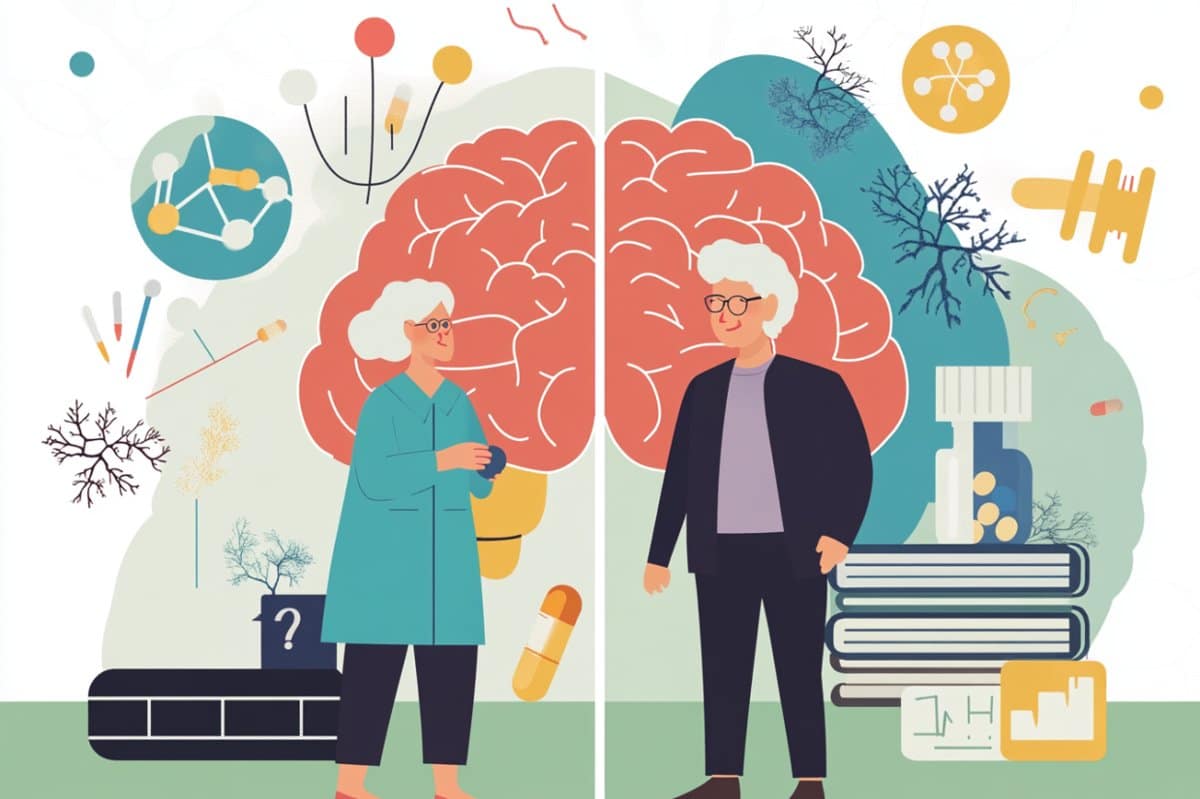Summary: A new study suggests that two widely used Type 2 diabetes medications—GLP-1 receptor agonists and SGLT2 inhibitors—may help reduce the risk of Alzheimer’s disease and related dementias. Researchers analyzed Medicare data and found that patients taking these drugs had significantly lower rates of cognitive decline compared to those using other glucose-lowering medications.
The findings point to potential neuroprotective effects, even for individuals without diabetes. Scientists plan to explore the broader implications of these medications as preventative or therapeutic options for Alzheimer’s in larger and more diverse populations.
Key Facts:
- Protective Link: GLP-1RAs and SGLT2is were associated with reduced Alzheimer’s risk.
- Neuroprotective Potential: These drugs may benefit brain health beyond diabetes control.
- Future Research: Studies will explore their effects in non-diabetic populations.
Source: University of Florida
A study led by researchers in the University of Florida College of Pharmacy has found that a pair of popular glucose-lowering medications may have protective effects against the development of Alzheimer’s disease and related dementias in patients with Type 2 diabetes.
In research published in JAMA Neurology on April 7, UF researchers studied Medicare claims data of older adults with Type 2 diabetes to assess the association among glucagon-like peptide-1 receptor agonists, or GLP-1RAs, sodium-glucose cotransporter-2 inhibitors, or SGLT2is, and the risk of Alzheimer’s disease and related dementias.

The research is supported by funding from the National Institute on Aging and the National Institute of Diabetes and Digestive and Kidney Diseases, both part of the National Institutes of Health.
The data showed a statistically significant association between a lower risk of Alzheimer’s and the use of GLP-1RAs and SGLT2is compared with other glucose-lowering medications.
According to the researchers, the findings indicated that the two drugs may have neuroprotective effects for people without diabetes and may help slow the rate of cognitive decline in Alzheimer’s patients.
Serena Jingchuan Guo, M.D., Ph.D., an assistant professor of pharmaceutical outcomes and policy and the study’s senior author, said these findings may point to new therapeutic uses for drugs commonly used to treat Type 2 diabetes and obesity.
“It’s exciting that these diabetes medications may offer additional benefits, such as protecting brain health,” Guo said.
“Based on our research, there is promising potential for GLP-1RAs and SGLT2is to be considered for Alzheimer’s disease prevention in the future. As use of these drugs continues to expand, it becomes increasingly important to understand their real-world benefits and risks across populations.”
Guo conducted this research in collaboration with William Donahoo, M.D., clinical professor and chief of the UF Health Division of Endocrinology, Diabetes and Metabolism, and Steven T DeKosky, M.D., deputy director of the McKnight Brain Institute and professor of Alzheimer’s research, neurology and neuroscience in the UF Department of Neurology.
As the study only included patients with Type 2 diabetes, Guo said next steps include evaluating the effects of the two drugs in broader populations by using recent, real-world data that captures their growing use in clinical settings.
“Future research should focus on identifying heterogeneous treatment effects — specifically, determining which patients are most likely to benefit and who may be at greater risk for safety concerns,” Guo said.
About this neuropharmacology and Alzheimer’s disease research news
Author: Eric Hamilton
Source: University of Florida
Contact: Eric Hamilton – University of Florida
Image: The image is credited to Neuroscience News
Original Research: Closed access.
“GLP-1RA and SGLT2i Medications for Type 2 Diabetes and Alzheimer Disease and Related Dementias” by Serena Jingchuan Guo et al. JAMA Neurology
Abstract
GLP-1RA and SGLT2i Medications for Type 2 Diabetes and Alzheimer Disease and Related Dementias
Importance
The association between glucagon-like peptide-1 receptor agonists (GLP-1RAs) and sodium-glucose cotransporter-2 inhibitors (SGLT2is) and risk of Alzheimer disease and related dementias (ADRD) remains to be confirmed.
Objective
To assess the risk of ADRD associated with GLP-1RAs and SGLT2is in people with type 2 diabetes (T2D).
Design, Setting, and Participants
This target trial emulation study used electronic health record data from OneFlorida+ Clinical Research Consortium from January 2014 to June 2023. Patients were 50 years or older with T2D and no prior diagnosis of ADRD or antidementia treatment. Among the 396 963 eligible patients with T2D, 33 858 were included in the GLP-1RA vs other glucose-lowering drug (GLD) cohort, 34 185 in the SGLT2i vs other GLD cohort, and 24 117 in the GLP-1RA vs SGLT2i cohort.
Exposures
Initiation of treatment with a GLP-1RA, SGLT2i, or other second-line GLD.
Main Outcomes and Measures
ADRD was identified using clinical diagnosis codes. Hazard ratios (HRs) with 95% CIs were estimated using Cox proportional hazard regression models with inverse probability of treatment weighting (IPTW) to adjust for potential confounders.
Results
This study included 33 858 patients in the GLP-1RA vs other GLD cohort (mean age, 65 years; 53.1% female), 34 185 patients in the SGLT2i vs other GLD cohort (mean age, 65.8 years; 49.3% female), and 24 117 patients in the GLP-1RA vs SGLT2i cohort (mean age, 63.8 years; 51.7% female). In IPTW-weighted cohorts, the incidence rate of ADRD was lower in GLP-1RA initiators compared with other GLD initiators (rate difference [RD], −2.26 per 1000 person-years [95% CI, −2.88 to −1.64]), yielding an HR of 0.67 (95% CI, 0.47-0.96). SGLT2i initiators had a lower incidence than other GLD initiators (RD, −3.05 per 1000 person-years [95% CI, −3.68 to −2.42]), yielding an HR of 0.57 (95% CI, 0.43-0.75). There was no difference between GLP-1RAs and SGLT2is, with an RD of −0.09 per 1000 person-years (95% CI, −0.80 to 0.63) and an HR of 0.97 (95% CI, 0.72-1.32).
Conclusion and Relevance
In people with T2D, both GLP-1RAs and SGLT2is were statistically significantly associated with decreased risk of ADRD compared with other GLDs, and no difference was observed between both drugs.







